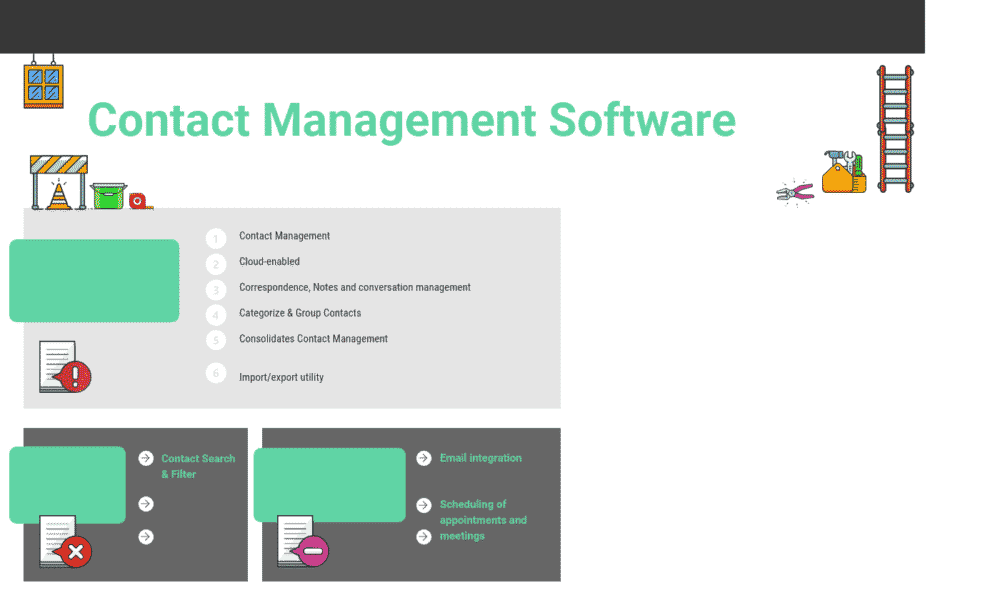If you are a business owner, you’ve probably heard of adages such as, ‘The customer is king’ and ‘The customer is always right even when they are wrong.’ Whether or not you hold fast to these adages, the fact is that customers form the backbone of any business. After all, what’s the use of a great product, if there is no one to buy it? Take any top 10 list of reasons businesses fail, and you will find that a lack of customer management features in it. In fact, about 30% of businesses go belly up because they have either ignored their customers or have failed to appeal to them effectively.
Additionally, the numero-uno reason customers stop using a brand is because they felt unappreciated by it. The message is clear: Brush aside customers at your own peril. This aspect makes contact management software (CMS) or (CRM) an essential tool in a business’s push towards productivity.
What is contact management software?
If it were just a question of storing all your customer’s names and email addresses, you could do that by maintaining a large excel sheet. Contact management software goes one step further. As the name suggests, it is software that helps you not only store customer data but also tracks and analyzes it to give you valuable information. These functionalities are something an excel sheet is ill-equipped to do.
Advantages of contact management software
Over the past two years, CRM usage has gone up from 56% to over 70%. Here are a few reasons why it is so ubiquitous today:
Gain customer insights
CMS helps you collect extensive information on your customers besides just their names and email addresses. These include critical analytical data, such as age, gender, location, and industry. Additionally, it gives you a customer’s behavioral data such as page views or email sign-ups that show you how they like to engage with your business. All this data allows you to paint a clear picture of who your customers are and what they want.
Easy data management
Storing valuable customer information is one thing. Finding it is quite another. CMS collects all pertinent customer data and saves it in one easily accessible central database. What’s more, it syncs customer information across all your platforms from social media to your website. This feature makes it handy for those pre-coffee customer phone calls when you just can’t recall anything about them. Running a quick search using the customer’s name or email address will give you everything from their last email to their payment history.
Personalized marketing and customer interaction
Almost 80% of consumers say that they are more likely to engage with a personalized marketing campaign than a generic one. With the centralized database and customer analysis that a CMS provides, it is easy to set up personalized advertising campaigns that cater to your customer’s interests. Moreover, you can record nitty-gritty details of your customers and use this to your advantage. Nothing can convince a customer that you are aware of them than remembering his or her pet’s name.
Increased productivity
At the end of the day, it comes down to the ROI. On average, companies using CSM see an ROI of over $8 for every dollar spent on it. This ROI is not only because of the improved customer capture and retention rates that using CMS can give you but also the time and effort you save on arduous administrative tasks. By automating processes such as data entry, customer scheduling, and invoice generation, CMS frees up you and your team to focus on other areas to grow your business.
Top 10 customer management software
There are over 300 different customer management products available today. Here are our picks for the top 10.
1. Zoho CRM
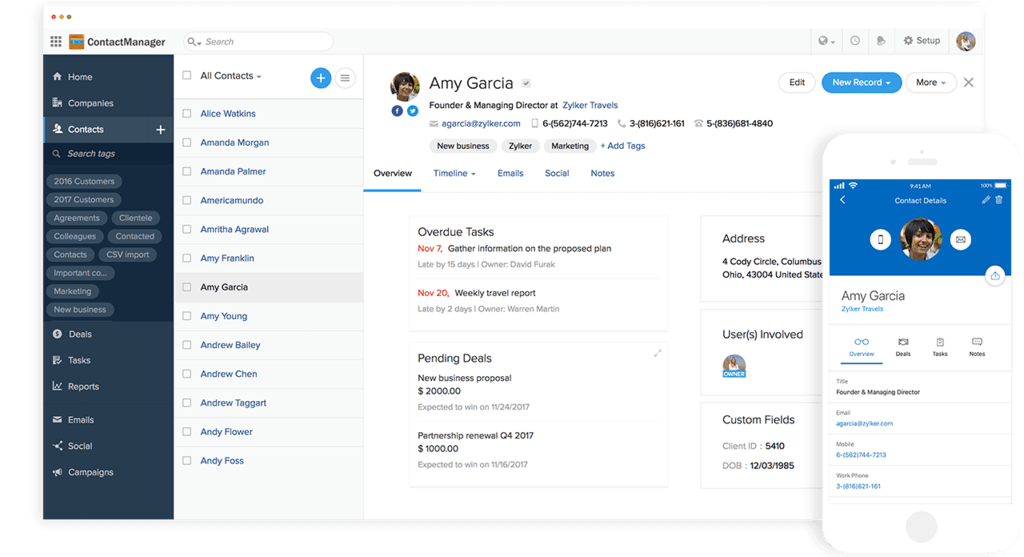
Features
Zoho CRM is a cloud-based customer management software with features and pricing plans tailored to meet small and midsize business needs. Its features cover all areas affecting a customer life-cycle, from sales to marketing, customer support services, and even inventory management.
The software’s SalesSignals feature tracks leads and prospects from a variety of platforms such as web forms, email, social media, and chats. This feature alerts users every time a potential lead mentions their company’s name in a Facebook or Twitter post. Besides, it integrates with LinkedIn Sales Navigator to give users professional information to help engage them better. Helpfully, Zoho CRM assigns a score to each lead based on user-set rules to help them determine which lead to focus on.
Zoho CRM lets users segment customers using their keyword tagging feature. This feature allows them to create targeted marketing campaigns with ease. Adding to this ease is the plethora of email templates available that frees users from the tedious task of drafting them. Additionally, the software’s AI feature, Zia, suggests optimal times to send these targeted emails.
This CMS also has a robust set of analytical tools that give users real-time reports on a variety of metrics. These include leads created, leads converted, sales trends, and campaign comparisons.
Pros
- Multichannel lead generation
- Comprehensive email marketing tools
- Robust reporting tools
Cons
- Customer support limited to weekdays
Price
Zoho CRM has five pricing plans.
| Free Plan | Free for three users Leads, contacts, and accounts Social media integration Workflow management Marketing automation Webforms |
| Standard Plan | $18/user/month billed monthly Sales forecasting Encrypted data transmission 100,000 records |
| Professional Plan | $30/user/month billed monthly Email integration Social CRM Google AdWords integration Unlimited records |
| Enterprise | $45/user/month billed monthly Encryption at rest Predictive AI Anomaly detectors |
| Ultimate | $100/user/month Premium support Email sentiment analysis Automation Suggestions |
2. HubSpot CRM
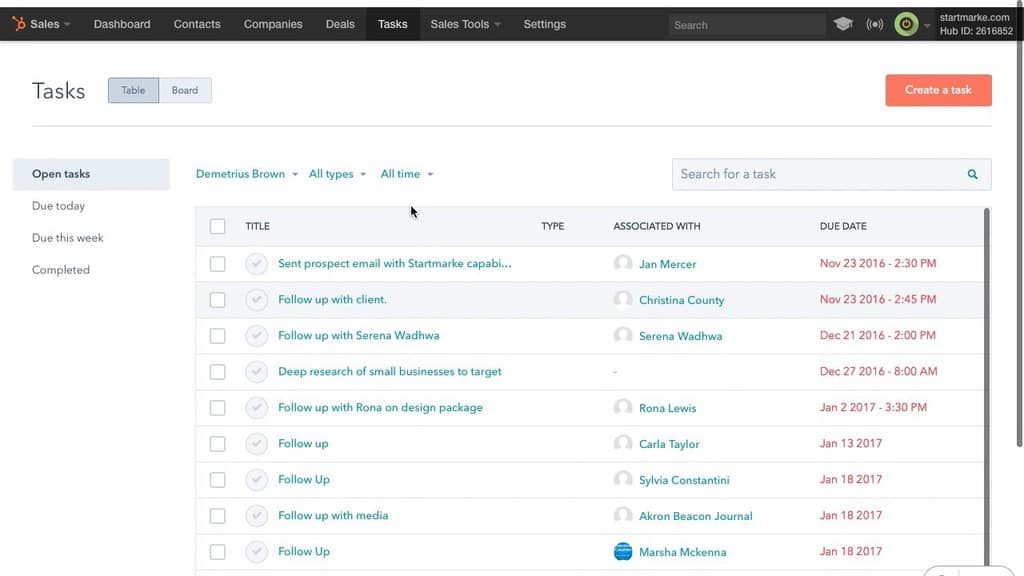
Features
With one of the best free plans on the market, HubSpot CRM is ideal for small businesses with tight budgets. Not only does this free plan have a ton of features, but it also lets users add unlimited team members and a whopping 1 million contacts.
HubSpot CRM has an easy-to-use dashboard that gives a complete overview of the user’s sales funnel. Users can track everything from leads won or lost, customer email interactions, appointments scheduled, and team performance. With its Gmail and Outlook integration, users can track clicks, and email opens. What’s more, it shows all the tracking stats in real-time.
Users can place calls to customers directly from the app’s web browser. They also have the option of recording these phone calls for quality reviews. Importantly, the intuitive software tracks these calls and adds them to the CRM reports. Another great tool is its live chat feature. Customers can interact with team members in real-time, which helps to build rapport and convert leads to paying customers.
The software integrates seamlessly with HubSpot’s marketing, sales, and service hub to give users the tools to build a comprehensive customer engagement strategy. However, depending on the add-ons you choose, it can end up becoming very pricey. As your company grows, you will need these add-ons, and so it is important that you take this future cost into consideration.
Pros
- Free premium features
- Unlimited users and contacts
- Easy to set up and use
- Live chat and customer calling options
- Tracks digital body language
Cons
- Add-ons lead to a disproportionate ramping up of price
- Weak reporting tools
Price
HubSpot CRM is free software that has the following features:
- Contact management
- Contact activity monitoring
- Gmail and Outlook integration
- Live chat
- Customer calling
- Email scheduling
- Email templates
- Forms Reporting dashboard
HubSpot add-ons
| Sales hub add-ons | $50-$1200/month Unlimited email tracking Call transcription Salesforce integration |
| Marketing hub add-ons | $50-$3200/month Advanced analytics YouTube integration |
| Service Hub add-ons | $50-$1200/month Advanced scheduling options Custom reporting |
3. Salesforce Sales Cloud
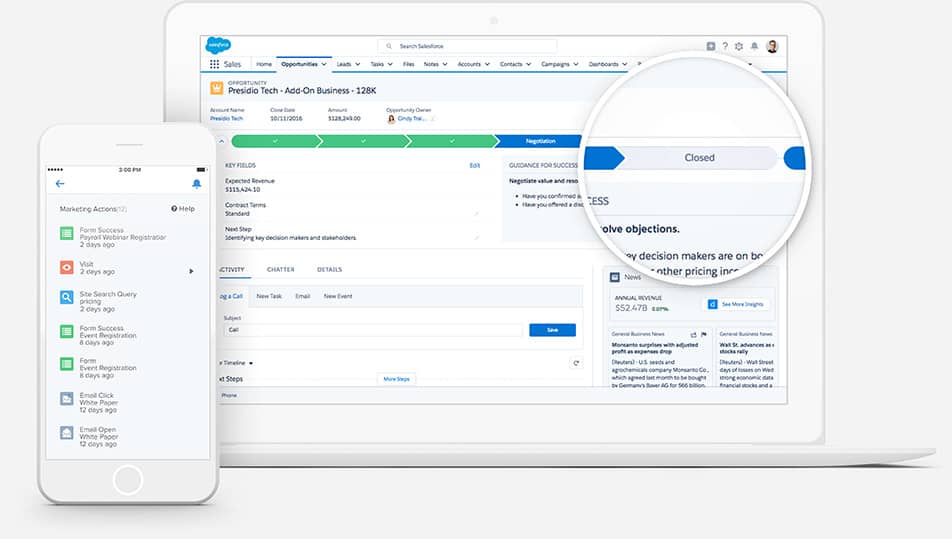
Features
A pioneer and market leader in the CRM software industry, Salesforce Sales Cloud has the pedigree and features to match its status. It has functions that cover every aspect of contact management, customer engagement, task management, and analytics. Add to this a robust mobile app and vast ecosystem of third-party integrations, and it is easy to see why they are popular. All these premium features come at a premium cost, however, putting it out of reach for businesses with tight purse strings.
Salesforce offers users comprehensive lead management. With it, users can get a bird’ s-eye view of a customer, including their communication and activity history. It even culls customer data from social media to provide a complete picture. Every time your business gets a lead, the software creates a task. Helpfully, Salesforce has automated workflows that assign these tasks to team members. Also, with features such as automated follow-ups and lead tracking, the Salesforce software ensures that no leads fall through the cracks.
The Salesforce reports feature collects data from all avenues to give users detailed analytical reports on everything from the sales team’s performance to weekly forecasts and much more. The analytics is bolstered by adding on the software’s AI platform called Einstein. Einstein uses historical data and other metrics to assign scores to each lead. Along with this, it gives users advanced analytical insights and helps users keep tabs on at-risk customers. This add-on starts at $75/month.
Pros
- Highly customizable
- Over 1000 third party integrations
- Easy-to-use UI
- Multichannel customer service
Cons
- Expensive
- Complex setup
Price
Salesforce Sales Cloud has four pricing plans. All plans are billed annually and have a 30-day free trial.
| Essentials | $25/user/month Accounts, contact, and lead management Email integration Mobile app |
| Professional | $75/user/month Lead registration Lead scoring Collaborative forecasting |
| Enterprise | $150/user/month Workflow automation Approval automation Advanced reporting |
| Unlimited | $300/user/month Unlimited customization Multiple sandboxes 24/7 Support |
4. Agile CRM
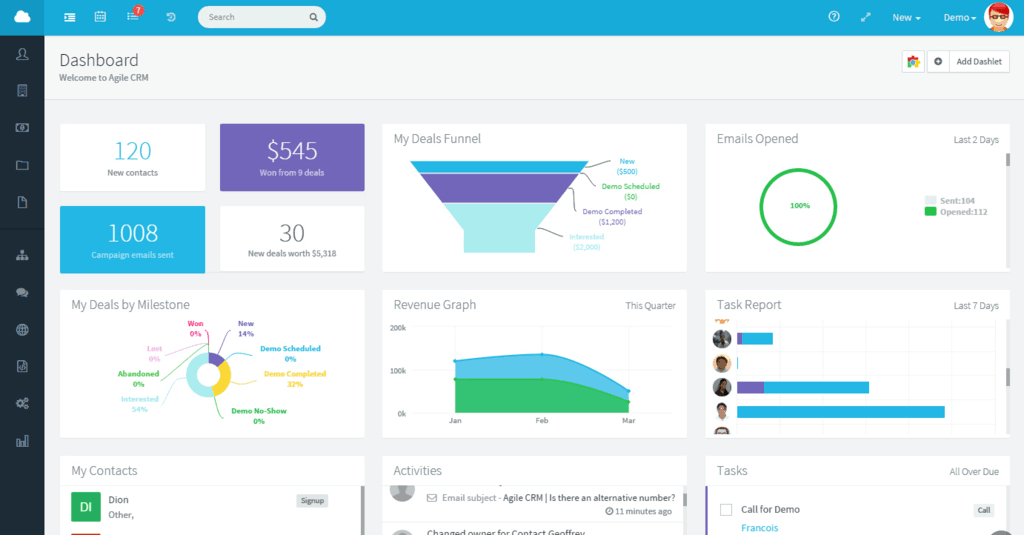
Features
Agile CRM has a wide range of features that make it appealing to both small and enterprise-level businesses. These include project management, scheduling, sales automation, marketing, and customer service features. Compounding, this is the software’s robust free plan, which, though not as good as HubSpot CRM’s, has enough features to satisfy the needs of a fledgling business. The free plan is thus a great choice for startups, and small businesses where every penny spent can have an impact on the bottom line.
The software provides users with a single-page view of customer data with integrated sales and marketing processes. This view makes it easy for them to ensure both departments are in sync, manage projects, and delegate tasks. The software’s drag-and-drop functionality enhances user-friendliness. For contact management, users can store and organize customer information any way they want. Importantly, the software provides a chronological view of customer data obtained from every angle, including social presence, web activity, and call notes.
Agile CRM has advanced automation features that make marketing a breeze. Apart from email and newsletter marketing, these features also include web forms and pop-ups as well as push notifications and exit strategies. Crucially, due to its integration with apps such as VoIP and Twilio, users also have the option of telemarketing. Another great feature is the software’s calendar functionality with which users can automate client-scheduling and appointment processes.
Pros
- Robust free plan
- Powerful marketing tools
- Calendar scheduling
- User-friendly UI
Cons
- Weak reporting tools
Price
Agile CRM has four pricing plans.
| Free | Up to 10 users 50,000 contacts Lead scoring, Appointment scheduling Email tracking |
| Starter | $9.99/user/month billed annually or $14.99/user/month billed monthly Web engagement Landing page builder 5000 branded emails Marketing automation Social monitoring |
| Regular | $39.99/user/month billed annually or $49.99/user/month billed monthly Basic reports Organized ticketing |
| Enterprise | $64.99/user/month billed annually or $79.99/user/month billed monthly 50+ plugins Email and phone support Advanced reports |
5. EngageBay
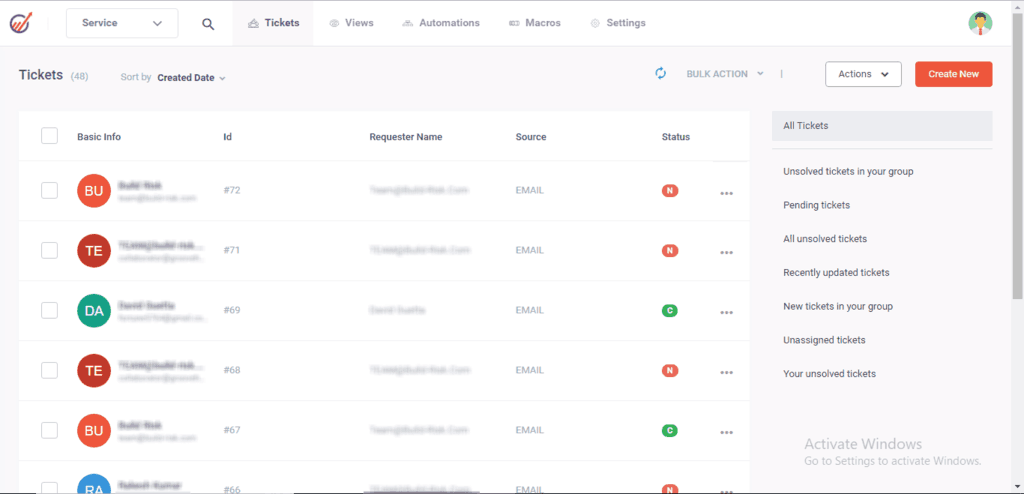
Features
EngageBay is a CRM solution that integrates the platforms of sales, marketing, and customer services into one. Its features include sales and marketing automation, email marketing, and landing pages, to name a few. The software’s affordable and scalable pricing plans, not to mention its feature-packed free plan, make it a great fit for startups and small businesses.
As the company name suggests, it excels at engaging and capturing website visitors and converting them into leads. The software provides users with several landing page templates that even non-tech personnel can use to create an engaging landing page. Also, marketing tools such as pop-ups, inline forms, and live chat boxes are at the user’s disposal to keep customers engaged.
This CMS software has several features that boost its marketing capabilities. First, it has a plethora of email templates to choose from that make email marketing easy. Second, its marketing automation features efficiently target leads across multiple channels and ensures that no customer falls through the cracks. Third, users can attract their target audience with Facebook ads and customizable SMS campaigns.
Pros
- Robust sales and marketing automation features
- Facilitates social media engagement
- Affordable
Cons
- No mobile app
Price
EngageBay has four pricing plans.
| Free | 1000 contacts and branded emails Contact management Email marketing Landing pages Live chat |
| Basic | $14.99/user/month 15,000 contacts + 10,000 branded emails Email templates Pop-ups Lead scoring SMS marketing |
| Growth | $49.99/user/month 50,000 contacts + 25,000 branded emails Marketing and service automation Push notifications |
| Pro | $79.99/user/month Unlimited contacts + 50,000 branded emails Advanced analytics Custom reporting Dedicated account manager Phone support |
6. Apptivo
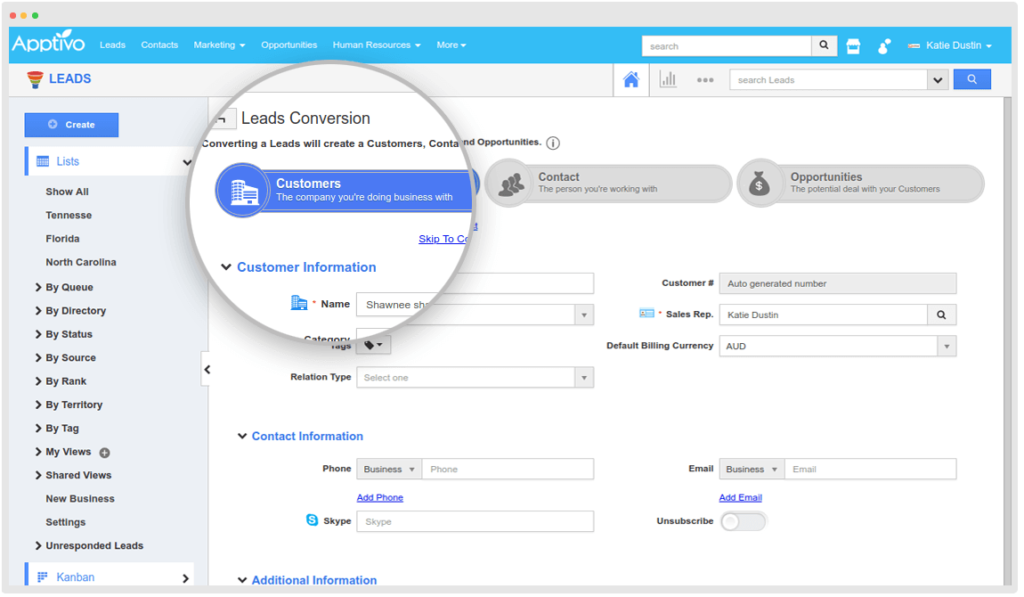
Features
Apptivo is an affordable yet robust cloud-based CRM solution targeted at small business owners. However, it has features such as project management, contract management, estimates, and invoices that larger companies will find useful. Additionally, the pricing plans are scalable enough to include a spectrum of budgets too.
The software’s contact management system allows users to maintain a central database of customer data. It integrates seamlessly and syncs contacts with all G Suite apps, saving users the time and effort needed to import or manually enter the data. This integration is important for small businesses since it allows them to make the transition to using professional CRM software smoothly. The software’s Profile Enrichment feature mines customer data from social media and LinkedIn as well. Apptivo makes it mandatory for users to input a closing date for each captured lead. This requirement motivates them to commit to the process of moving leads down the pipeline from potential customers to paying customers.
Apptivo has over 40 features ranging from campaign management to document and inventory management. Most of these features are customizable so that users can tweak things to suit their needs. Enterprise plan users can take this customization to the next level by white-labeling their website to replace any Apptivo branding with their own. Rounding off its impressive features is Apptivo’s stellar mobile app that is just as good as the desktop version.
Pros
- Easy to set up and use
- Affordable
- Highly customizable
- Excellent customer service
Cons
- Limited third-party integrations
Price
Apptivo has four pricing plans
| Starter | Free for three users 500MB/user Basic contact management Standard reports and support |
| Premium | $10/user/month 3GB/user 1000 emails/user 2000 API calls |
| Ultimate | $25/user/month 10GB/user 3000 emails/user 20,000 API calls Priority support |
| Enterprise | Custom pricing 5000 emails/user White labeling Custom integration Dedicated account manager |
7. Freshsales
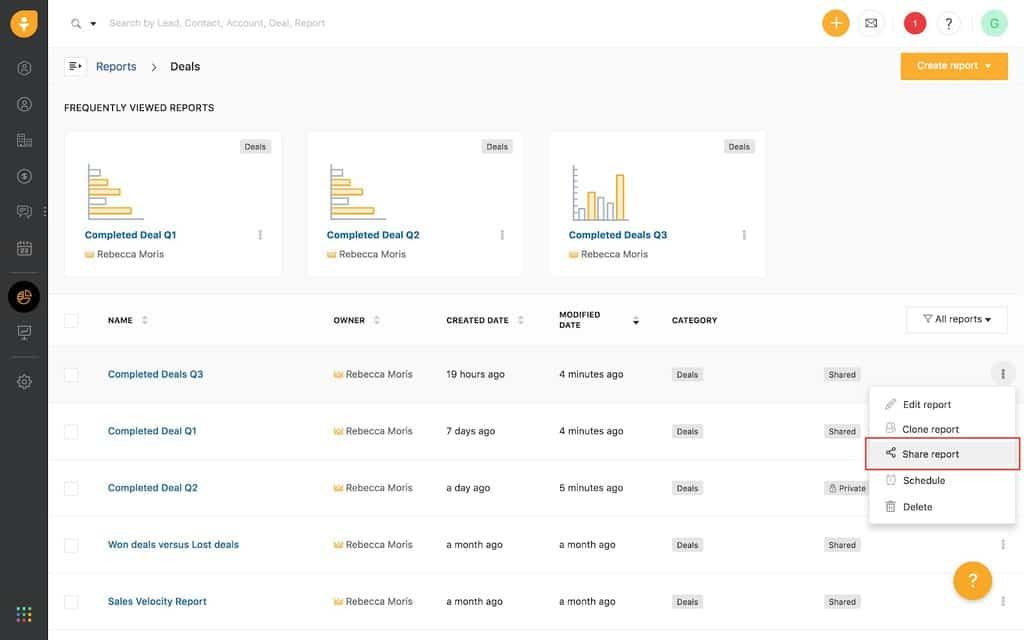
Features
Freshsales is just one of the growing lineup of products put out by Freshworks. It is its parent company’s sales CRM product. Being part of the Freshworks family means that the software integrates with all of its siblings to provide a range of functionalities from customer messaging to IT services management and even human resource management. Freshsales is easy to use and robust CRM software with an affordable pricing structure; all features that make it appealing to SMBs.
The software is excellent at gathering and managing leads. It gives users a comprehensive view of leads generated, conversions made, and deals won or lost. Furthermore, each lead is ranked based on online behavior and other metrics. This way, users can spend more time nurturing leads instead of trying to read between the lines.
As for marketing, Freshsales allows users to send out bulk, automated email campaigns. These emails can be created using customizable email templates, which helps save a lot of time for your marketing team. More importantly, the email tracking feature lets users track the performance of all their marketing campaigns.
Pros
- Powerful CRM features
- Affordable
- Easy to set up and learn
Cons
- Limited third-party app integrations
Price
Freshsales has five pricing plans
| Sprout | Free Unlimited users Contact and lead management Phone marketing Mobile app |
| Blossom | $12/user/month Pipeline management 250 emails/user/day Two sales campaigns/user SMS integration 2-way email sync Lead scoring |
| Garden | $25/user/month 500 emails/user/day Five sales campaigns/user Advanced reporting and customization |
| Estate | $49/user/month 1000 emails/user/day Ten sales campaigns/user Advanced lead scoring Event tracking Reports dashboard |
| Forest | $79/user/month 2000 emails/user/day 25 sales campaigns/user Audit logs |
8. Pipedrive

Features
Pipedrive is an intuitive and efficient CRM tool that solo entrepreneurs and small businesses can use to not only manage their contacts but also sell their services more effectively. As its name suggests, it focusses on pipeline management. It gives users a 360-degree view of the sales pipeline along with suggestions on the right deals and activities to prioritize. The software even notifies users when a deal stays inactive for too long. Besides, users can create unlimited and customizable pipelines that reflect their company’s unique goals.
Likewise, the software boasts of efficient contact management and lead collection system. Apart from its customizable web forms, Pipedrive’s many integrations ensure that you can import leads from multiple platforms, including email and social media. Users also have the option of embedding a chatbot on their webpages to qualify and route new leads into a pipeline. These chatbots can also schedule meetings and answer customer queries.
This CRM software has workflow automation features that negate the need for users to waste time on repetitive processes. Once you record a process once, all it takes is the click of a button to repeat that entire process. What’s more, the Sales Assist AI feature lets users know which third-party integration can automate a manual task. Along with this, Pipedrive has several email templates complete with images and rich text that make the marketing process an easy one.
Pros
- Intuitive UI
- Google Calendar and Maps integration
- Supports multiple languages and currencies
Cons
- Weak analytics
Price
Pipedrive has four pricing plans
| Essential | $15/user/month Custom pipelines Activities and calendar view Customizable dashboard |
| Advanced | $29/user/month Sales automation AI sales assistant Email integration and tracking |
| Professional | $59/user/month One-touch calling Call tracking Bulk emails Team management Revenue forecasting |
| Enterprise | $99/user/month billed annually Custom onboarding Dedicated account manager Phone support Advanced customization Advanced security |
9. Salesmate
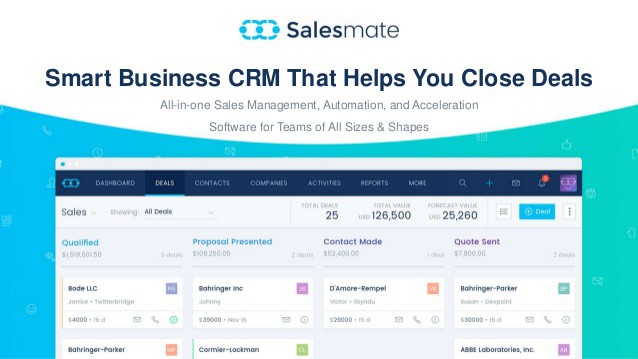
Features
Salesmate is a cloud-based CRM software that is focused on streamlining a business’ sales workflow. The software’s key features include sales pipeline management, contact management, inbuilt customer calling, and email marketing. These, along with its affordable pricing plans, make it appealing to small businesses and solo entrepreneurs.
Managing a company’s sales pipeline is where Salesmate excels. Salesmate’s deal management tool gives users a real-time view of all sales pipelines. This visual pipeline helps users not only move their leads through different stages faster but also helps them spot roadblocks in their team’s performance with one glance. What’s more, users can customize each pipeline, adding as many stages, activities, and team members to it as they want.
The software’s contact manager syncs contacts from various platforms through its vast network of integrations such as MailChimp and G Suite integration. Importantly, users can view and manage all their contacts through a single page. Also, Salesmate gives users a graphical timeline of a contact’s history that acts as a visual guide in monitoring and planning the next steps for that customer.
Furthermore, Salesmate has an inbuilt virtual phone system with which users can contact their customers through text and calls. The software’s workflow module helpfully assigns these calling and texting tasks to team members. Other key features here include call forwarding, recording, and tracking.
Pros
- Affordable
- Intuitive and easy-to-use UI
- Robust contact and pipeline management
- Inbuilt customer calling
- Excellent customer service
Cons
- Weak marketing automation tools
Pricing
Salesmate has two pricing plans.
| Starter | $15/user/month Contact management Calendar sync Pipeline management Deal and activity management Email sync, tracking, and templates Built-in calling 250 emails/user/day |
| Growth | $30/user/month Service management Email and text scheduling Custom reports Email analytics 500 emails/user/day |
10. ActiveCampaign
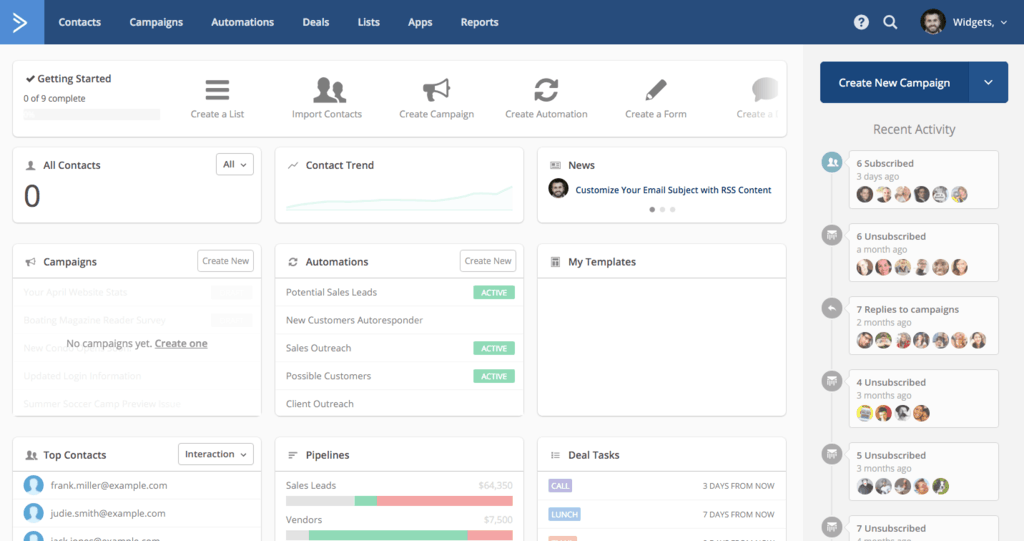
Features
This integrated CRM, sales, and marketing software boasts of email marketing features that rival those of MailChimp and Constant Contact. Add to this, its powerful automation tools, and it is easy to see why they have become a powerhouse in the marketing industry.
With ActiveCampaign, users can send a variety of emails from mass broadcast emails to targeted emails and everything in between. Users can additionally set parameters that trigger emails based on purchases or website engagement. Importantly, the software has a vast library of templates with a drag and drop functionality that lets users set up email campaigns with ease.
Adding to this ease is ActiveCampaign’s robust automation features that can be applied to everything from creating custom email campaigns to personalized SMS messaging and Facebook advertising. What’s more, users can test out any automation they implement with A/B testing to see what’s working and what’s not.
Not just marketing, ActiveCampaign also has sales automation tools that take tasks such as nurturing leads, updating deals, and creating and assigning tasks off the user’s hands, allowing them to concentrate on other vital processes. Besides, the software intuitively assigns a lead score to each contact based on their online behavior.
Pros
- Powerful marketing automation tools
- Excellent tracking and reporting functionalities
- Reasonably priced
- Good customer support
Cons
- The moderate learning curve for non-technical personnel
Price
ActiveCampaign has four pricing plans
| Lite | $15/month Up to 3 users Email and newsletter marketing Subscription forms Marketing automation |
| Plus | $70/month Up to 25 users Sales automation Facebook monitoring Lead scoring SMS marketing Custom user permissions |
| Professional | $159/month Up to 50 users Predictive content and sending Advanced reporting Site messaging Free Onboarding consultation |
| Enterprise | $279/month Unlimited users Custom domain Free design services Free social data Dedicated account manager Phone support |

